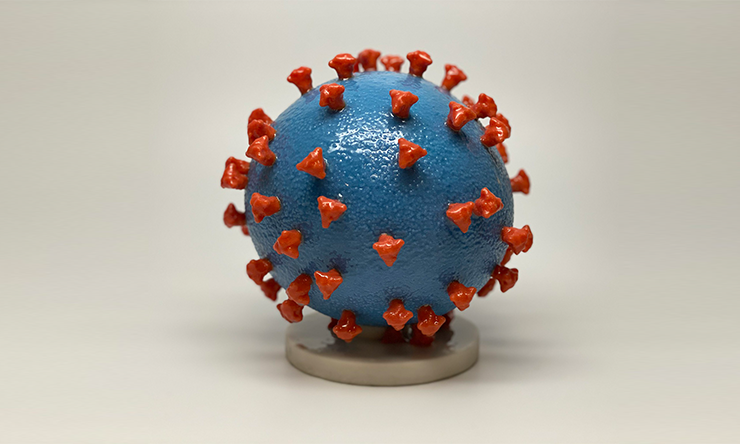Slowing the spread of COVID-19
As the spread of COVID-19 continues, more public events are being scaled down or even cancelled. It is all part of trying to slow the spread of coronavirus. Experts at Baylor College of Medicine say to do this, one should practice social distancing or, if needed, isolation or taking part in a self-quarantine.
“While we don’t think we can completely stop the spread of COVID-19, one of our goals is to lessen the number of individuals exposed,” said Dr. Laila Woc-Colburn, infectious disease specialist and associate professor at Baylor. “Slowing the spread not only prevents healthcare workers from being overwhelmed with patients, but also gives those that are most vulnerable to the virus, mainly those over 50 and those who are immunocompromised, a lower chance for illness.”
Social Distancing
According to the Centers for Disease Control and Prevention, social distancing means remaining out of congregate settings, avoiding mass gatherings and maintaining a distance of approximately 6 feet from others when possible. Most recently, people are being asked to stay away from crowds of 50 people or more.
COVID-19 is believed to be spread through air droplets from an infected person sneezing, coughing or touching their face and then touching surfaces that others might touch. It is not certain if it also is spread through airborne infection. That means an infected person might sneeze or cough and the particles stay in the air for long periods of time, infecting those that come in contact.
Isolation
Isolation is suggested for someone who is believed to be infected and potentially infectious. This is usually done in a hospital setting. There are procedures that must be followed by healthcare workers, such as donning protective gear when entering a COVID-19 patient area and doffing the protective gear when exiting. This measure is taken to keep the healthcare worker from becoming infected and spreading the virus to other patients and the public.
Quarantine
Those who believe to have been exposed to COVID-19 are being asked to self-quarantine. That means separating yourself from others, even if you are not showing any symptoms of the virus. It is believed that some may carry the virus without showing symptoms and inadvertently infect others. It is a way to also monitor if symptoms develop while avoiding any possible spread to others.
A self-quarantine usually means staying home from school, work and public spaces for up to 14 days, as recommended by the CDC, and only leaving to seek medical attention. Call ahead to your doctor if you do need medical attention. You should also separate yourself from other people and animals. Avoid sharing household items with others, clean and disinfect high-touch areas, cover your mouth while coughing or sneezing and wash your hands as often as possible.
If you or another member of your household is self-quarantined or sick, use separate bedrooms and bathrooms if available. Avoid sharing personal items like food and drinks. Provide your sick household member with clean, disposable facemasks to wear at home, if available. Clean the sick room and bathroom as needed to avoid unnecessary contact with the sick person. If surfaces are dirty, they should be cleaned using a detergent and water prior to disinfection.
If you live alone and become sick during a COVID-19 outbreak, you may need help. If you have a chronic medical condition and live alone, ask family, friends and healthcare providers to check on you during an outbreak.
For Everyone: mental and emotional health
Another concern to keep in mind is mental and emotional health. Outbreaks can be stressful for adults and children.
- Try to plan ahead and ask others for help to ensure that you can successfully stay at home.
- Stay in touch with family and friends with chronic medical conditions by phone, email or other electronic methods.
- Stay away from vulnerable individuals, such as the elderly and those with underlying health conditions, as much as possible.
For Everyone: precautions
Practice everyday preventive actions to help reduce your risk of getting sick and remind everyone in your home to do the same. These actions are especially important for older adults and people who have severe chronic medical conditions:
- Avoid close contact who people who are sick.
- Stay home when you are sick, except to get medical care.
- Cover your coughs and sneezes with a tissue and throw the tissue in the trash.
- Wash your hands often with soap and water for at least 20 seconds, especially after blowing your nose, coughing, or sneezing; going to the bathroom; and before eating or preparing food.
- If soap and water are not readily available, use an alcohol-based hand sanitizer with at least 60 percent alcohol. Always wash hands with soap and water if hands are visibly dirty.
- Clean and disinfect frequently touched surfaces and objects such as tables, countertops, light switches, doorknobs, and cabinet handles.
“We saw what happened in some areas that were first hit by COVID-19 – they were unprepared simply because they did not have warning, and infection and death spread rapidly. In the United States, we have had a bit more time to prepare and take these extra measures, and the rate of spread has not been quite as rapid. That is why we suggest people take these tips seriously, for the good of community health and their own,” Woc-Colburn said.
Get more COVID-19 health tips and visit Baylor College of Medicine’s Coronavirus Preparedness site.







 Credit
Credit



